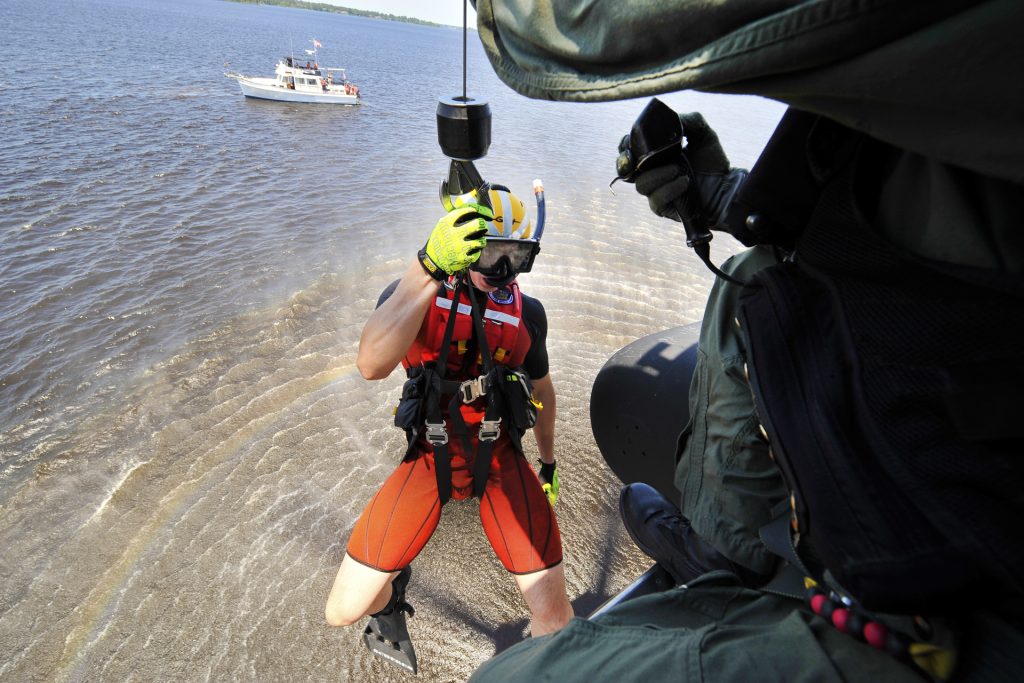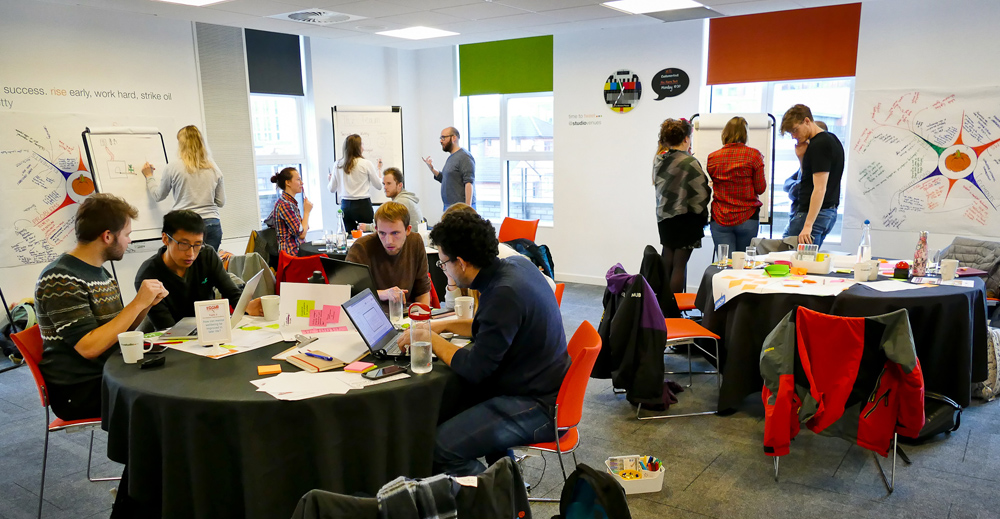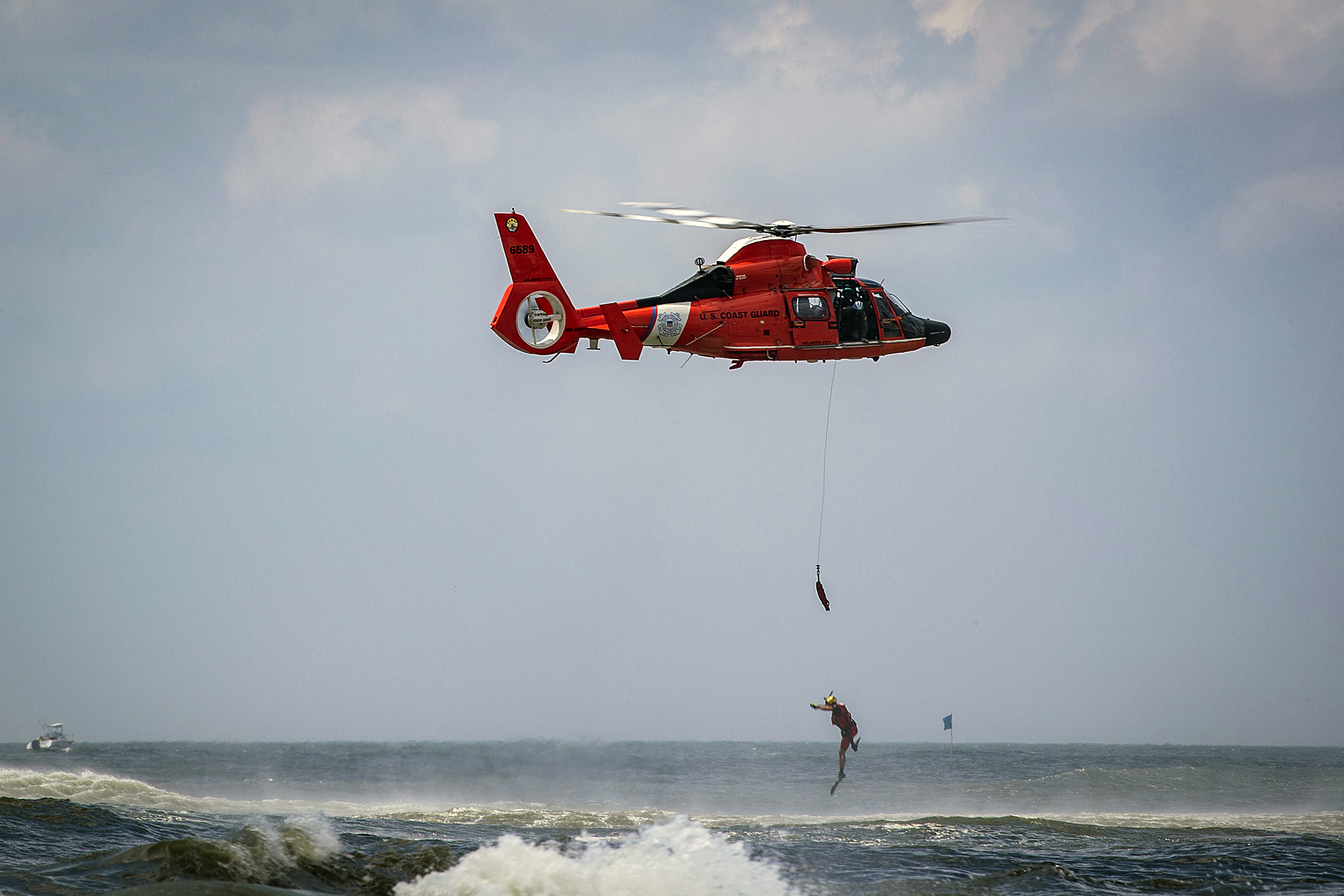Here’s the situation. You’re wearing a snorkel, fins and dry-suit, your feet dangling from the door of a helicopter battling gales in the Arctic ocean and hovering some 50 feet above raging seas. You’re pushed into the bitter ocean. People are clinging to an upturned hull that’s being destroyed by the waves. They’re too cold or unconscious to attach themselves to a rope, or climb anything. You are their only hope of survival.
The question: How much training would you demand to do that job? Remember, if you mess up, you’re responsible for their deaths, and possibly the deaths of your team too.
Alaskan Rescue Swimmers are the most elite, intensely trained people in the U.S. Coast Guard. The number of errors permitted on a mission is zero, and their motto is simply “That others may live“.
In a few particular respects their job is very easy. Motivation is clear and strong (saving lives); the need for training is clear, and serious; practice and rehearsal are obviously paramount (you don’t have to ask why you bother) – just knowing the theory isn’t enough. And feedback is easy – the consequences of mistakes are immediate and life threatening.
Training for Research
What does this have to do with us as researchers?
Wind’s principle in philosophy states:
“The common place may be regarded as a reduction of the exceptional, but the exceptional cannot be understood as an amplification of the commonplace”.
Edgar Wind (1)
In other words, the mushy ‘commonplace’ day-to-day routine of office and laboratory life makes it difficult to see exactly where we’re going, or to have a crystal clear motivation – or to really see just how important some skills are for our careers. For example: working with others (especially ‘difficult’ people and situations); coming up with new ideas of value; planning and strategy; leadership of yourself and others – and so on. None of those are technical aspects of our discipline, but I hope you’d agree they are all just as vital ‘field-skills’ for a research career, as the practical rescue skills that the Alaskan Coast Guard hone by explicit rehearsal and repeated practice.
If Wind’s principle holds, then our more commonplace how-to-train situation may be regarded as a reduction of the exceptional Rescue Swimmer ‘training’ example – in some respects at least. The comparison can shed understanding on our own situation where it’s harder to see the immediate significance and value of training ourselves, and just how far that can take us.

The exceptional example of Rescue Swimmers makes the significance of training visible because their realities are so much more physical, present and threatening, and importantly the ‘feedback’ so much more immediate. In other words “clear”.
How can we get that, when it’s not so obvious what impact our daily actions have on longer-term outcomes, and on others, in our professional lives? Why does research become a drudge for some researchers and groups, but others buzz with excitement?
Play
Nature has an answer for how to develop capabilities. It’s “play“. The innocuous, childish, word belies its significance. There’s a good reason why young animals, kittens for example, play. It’s a formal mode where we can push the envelope for developing capacities and prepare us for the harsh challenges in life, but without the real risk and danger. You could call it training. Nature creates the safe space for practicpre and rehearsal by play. It’s a reason why such creatures have gestures, just as we have smiling and laughing, to signal it isn’t “serious” conflict, rather we’re just training and building excess talent for when we need it in life. That’s also behind humour’s power to de-escalate situations.
It’s surprising in fact how little training, play, and rehearsal we get in professional environments – compared with, say, Alaskan Rescue Swimmers. Where is the safe space to try things out, working with others on serious things, uninhibited by taking risks that could be career threatening for “real”?
Research Sandpits – Playing with Research
“Research Sandpits” are a real and serious thing, used by research councils to design and fund sizeable projects quickly. In main ways they happen to condense important features of life as a researcher into a short time-frame. Because of that, the impacts of what we do in them are immediate and visible”, which is why they also make a good training environment. They work like this: a group of researchers, who likely don’t know each other, are thrown into a room and presented with a research Grand Challenge. They have to find colleagues, form teams, come up with new ideas of value that makes use of the expertise in the group, figure out how to make a compelling research case for that idea, and present it to a panel of experienced academics to assess as a research case.

Much of our explicit focus as researchers is on the technical issue of our field. Sandpits contain the missing, unspoken part: given the expertise and talents we have, how do we work with colleagues from different disciplines, to collaborate and put great cases together? That’s a practice. You can gain years worth of ‘experience’, and build confidence along the way – often by “failing in style”, much as kittens do as they become the superbly focused and coordinated athletes of the animal kingdom that cats are.
Because of Wind’s principle, you have the real advantage that few other young researchers will realise just how much you can build your own capacities when we take training as seriously – as in the exceptional case of the Rescue Swimmers.
And maybe, with this kind of approach, you could become the elite research equivalent of the Alaskan Rescue Swimmer – I wonder what that would be?
Adrian West
Notes
- Edgar Wind (1967) “Pagan Mysteries in the Renaissance“, Harmondsworth, England, Penguin Books.
